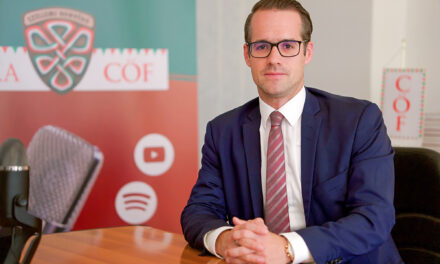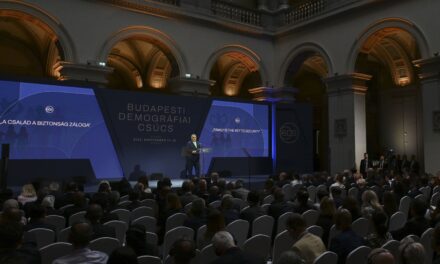Last year was a turbulent year for the European and American elections and for the political forces of the right.
Following the European Parliament elections on June 9, the Patriots for Europe party family (PfE) was established, establishing the third largest faction in the European legislature. And on November 5, the Republican presidential candidate and former president Donald Trump, who campaigned for the end of the war in Ukraine among other things, won the American presidential election, and the right wing won a majority in the lower and upper houses of Congress.
It can therefore be said that the sovereignist forces won significant victories in the countries of the collective West this year.
Great empowerment also brings great opportunities and struggles, all of which require the deployment of new types of tools for political mobilization. Fanni Lajkó, analyst at the Fundamental Rights Center, who evaluated the most important lessons from last year's elections, spoke to hirado.hu about these opportunities and further political struggles.
Prime Minister Viktor Orbán has been talking about the possibility of a comprehensive right-wing breakthrough for many years. In this regard, the expert highlighted the creation of the Patriots for Europe (PfE) party family, which, according to him, gave a new direction to the continent's right-wing parties and strengthened the coalitions aimed at protecting national sovereignty.
"The creation of the PfE faction provides an opportunity for effective resistance to left-wing and liberal political alliances," emphasized Fanni Lajkó,
who also spoke about how his strength is determined by the political harmony and willingness to compromise between the individual member parties, thus ensuring a unified action in the European Parliament. However, the PfE's room for maneuver is also affected by the movement of left-liberal forces in Europe, the expert mentioned the agreement of the European People's Party, the Socialists and Democrats, and the Renew faction, according to which they mutually support each other's proposals in the cycle until 2029.
"This comprehensive liberal pact also has a Hungarian aspect, because in practice it means the European cooperation of Péter Magyar and Ferenc Gyurcsány," added the expert.
When it was founded, the PfE became the third largest group in the European Parliament, and the plan is to become the second force. This is possible with further expansion and alliances, in this matter a closer alliance with the European Conservatives and Reformers (ECR) faction seems more likely than before, which has organizational implications in addition to the points of agreement related to the political direction.
"The close cooperation between ECR and Patriots for Europe is still guaranteed, as the political alliance between the two groups rests on strong foundations"
Fanni Lajkó emphasized.
On December 15, Italian Prime Minister Giorgia Meloni and leader of the Italian Brothers (FdI) party resigned from the presidency of the ECR, to be replaced by former Polish Prime Minister Mateusz Morawiecki, whose party, Law and Justice (PiS), is also a member of the ECR.
According to the expert, Meloni was able to make such a decision on the one hand, because a person who can perform the duties of the presidency full-time should take over the leadership. On the other hand, the fact that Meloni's party, the FdI, achieved a significant result in the European Parliament elections, as it delegated 24 representatives to the ECR, makes Italy the country with the largest delegation in the faction.
Thanks to this success, Meloni's political influence has been strengthened and he now has the opportunity to focus on his domestic political priorities.
And the unified European right-wing action, if only indirectly, may find understanding in Washington to a greater extent than before, thanks to the victory of Donald Trump in November. The expert explained that Donald Trump's victory in the United States has reconfirmed right-wing trends and indicated that conservative policies based on national sovereignty continue to play a key role in international politics.
"Trump's victory not only transformed American politics, but also inspired right-wing movements globally, strengthening the demand for conservative values"
he added.
All of this together shows that 2024 was a globally defining political year, during which a global right-wing political trend emphasizing the protection of national sovereignty and conservatism began to emerge.
The current political events highlight the fact that the sovereignty of our country is constantly being attacked from abroad. One example of this is the issue of migration, which is increasingly dividing Europe. Brussels and many Western political forces continue to push for migration, despite the fact that both migration and integration have proven to be failures in practice. The Magdeburg attack is also a tragic example of this, as it once again proved the weaknesses and failure of the Western integration policy.
That is why initiatives that oppose globalist political tendencies that seek to undermine national sovereignty are appreciated.
The National Resistance Movement (NEM), established on December 1, can be considered a similar initiative, which Fanni Lajkó also participated in founding. According to the expert, the movement is "a revolutionary response against the coercive power of the global elite and European political centralization". Their goal is to shake up society by using the tools of digitalization, and to use the power of digital activism to mobilize it for the protection of national sovereignty, to make the national resistance more organized and effective.
An important tool of the movement is an extensive presence on social media. The expert emphasized:
anyone can contribute to the causes and goals of NEM with their own video materials and content.
Their ultimate goal is to channel citizens' opinions and suggestions to a common platform where these voices can result in real political and social change.
Cover photo: In the photo published by the Prime Minister's Press Office, Prime Minister Viktor Orbán, the president of Fidesz, Santiago Abascal, president of the Spanish Vox party (j2), Afroditi Latinopulu, president of the Greek Voice of Logic (Foné Logikés) party (j), Italian Prime Minister Matteo Salvini deputy, president of the League party (b2) and Kinga Gál, first vice-president of the European Parliament group Patriots for Europe (b) at the meeting of the leaders of the Patriots for Europe party group in the Hungarian House in Brussels
Source: MTI/Minister's Press Office/Zoltán Fischer













